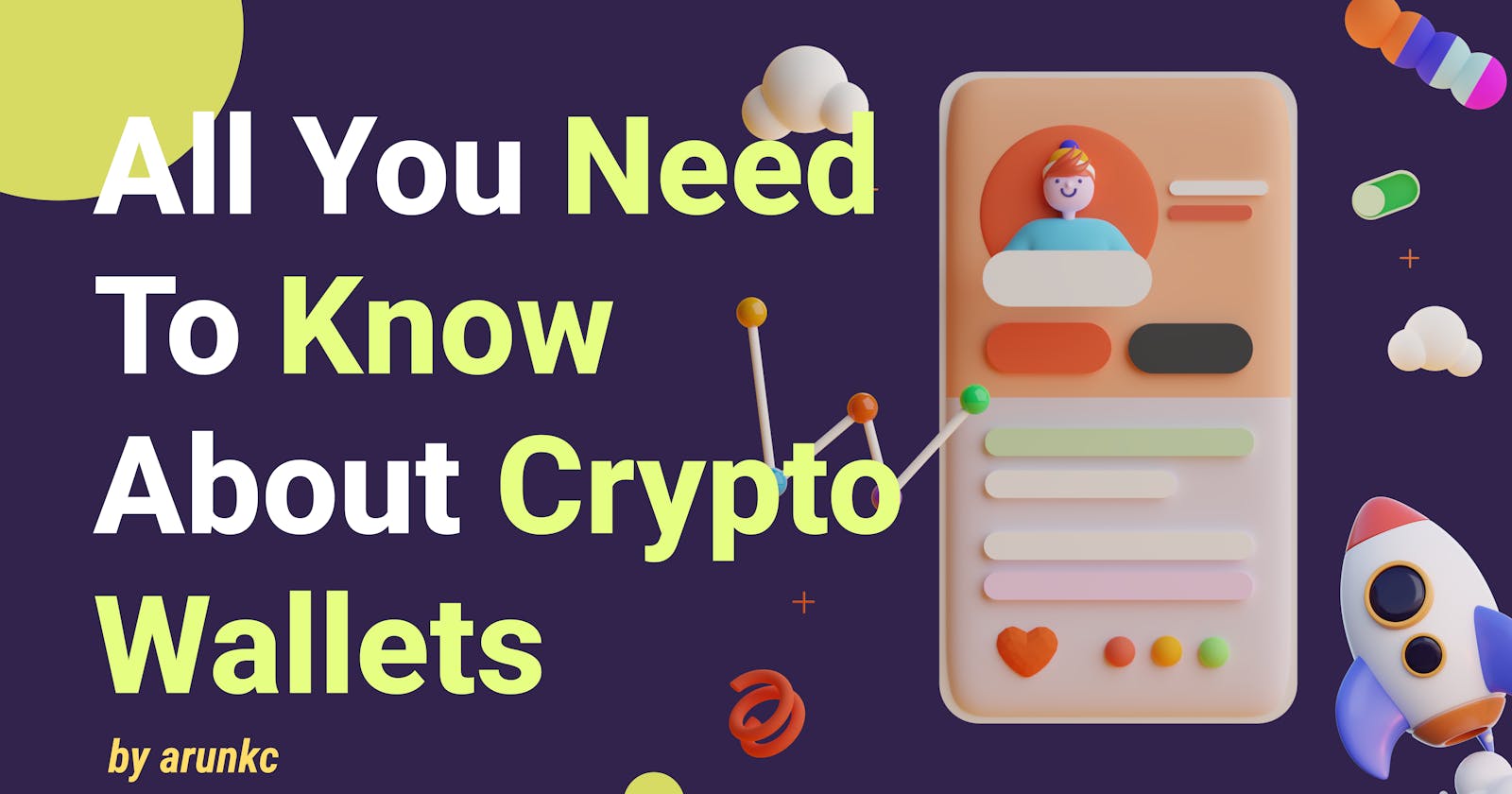Are you interested in Web3? If yes, then the first thing you need to do is actually do some small transactions over the chain (if it's no then say yes and continue reading XD). For that, the very first thing you need is a wallet.
The very first transaction that I did using my wallet was staking at ETHGlobal. At first, it may feel overwhelming but you need to do some transactions yourself to get a feel of it. At the end of the day, it's just like the usual transaction that you do using your bank accounts.
In this article let's discuss all the things that you need to know about crypto wallets.
What is a crypto wallet? 💳
A crypto wallet is like a regular bank account for your digital assets like cryptocurrencies and NFTs. It allows you to send and receive digital transactions over the blockchain. What is a blockchain you ask? It's a peer-to-peer distributed public ledger of transactions. If you want to know more about blockchain read about it here.
Now coming back to our topic, crypto wallets don't actually hold your cryptocurrency. Instead, wallet addresses are added to the ledger as part of the transaction details. From there, you can derive the amounts in each wallet address.
Instead of thinking of the wallet in a traditional sense, where cash is actually inside your wallet, think of it as a key to access all of your funds. The cryptocurrency doesn't actually exist inside a wallet, instead, it lives on the blockchain and your wallet gives you access to these cryptos assigned to your private key, or let's say your account.
How does it work? 🛠
A crypto wallet stores the public and private keys for cryptocurrency transactions. In addition to this basic function of storing the keys, a crypto wallet more often also offers the functionality of encrypting or signing information. Signing can for example result in executing a smart contract, a cryptocurrency transaction, etc.
A single wallet can have more than one public key and/or private key. Basically, the public key(s) is derived from the private key.
Let me try explaining it in simpler terms. Consider blockchain as the bank that has all the information about the transactions. Your private key is the secret passphrase to your treasury and your public key is your bank account number. The public key is also referred to as wallet addresses. Anyone who knows your wallet address can send transactions to your account. Using the wallet you are able to check your balance or send and receive transactions.
Don't EVER share your private key. It's the almighty access to your fund's pal!

You will get a better understanding of this if you know about cryptography.
In technical terms, the private key is created using cryptographic algorithms on a random number generated. The public key is then generated using this private key.
Most modern wallets use a "seed phrase" to generate a private key. The seed phrase is a 12 to 24-word combination. With the seed phrase, users can generate private keys. If you have multiple private keys, you can generate them by the seed phrase and don't need to remember each private key. In other words, the seed phrase gives access to all keys in the wallet.
Types of crypto wallets 🧬
There are two types of crypto wallets hot wallet and cold wallet. But before getting into those you need to know what are custodial and non-custodial wallets.
Custodial Wallets 🔒
Are you using any exchange platforms such as Coinbase, Binance, Robinhood? If so then you are trusting these third parties. They have your private key and signs transactions on your behalf. This is exactly what custodial wallets are. Here you are trusting a third party with your private keys.

It does have its own advantages. The platform is easy to use and you can start buying/selling right away once you create an account. Users can also benefit from lower transaction fees, recovering their account if they lose their password, etc.
But then again the disadvantage is that you lose control of your keys. You are entirely dependent on the third party. If there are any issues with the third party, such as a cybersecurity attack or regulatory issue, you can lose your crypto.
Non-Custodial Wallets 🔐
Since you have gone through custodial wallets I bet you already have an idea what a non-custodial wallet is. Here there is no third party in between. Therefore, the user is the only person that has the private key and/or seed phrase.
Now this fits right into the decentralization world, unlike the custodial wallets. As you know with great power comes great responsibilities XD. It's exactly like that in the case of non-custodial wallets. Since the private key is only with the user, the user is fully responsible for the security and the backup of the wallet. There won't be any customer service to help you in case you lose your private key.

If you lose your private key then that's it! You have lost access to your wallet. So keep it safe. You have complete control over it and likewise, have a great responsibility.
Hot Wallets 🔥
Both hot and cold wallets are non-custodial wallets and they differ according to where the keys are stored.
A hot wallet is a software-based wallet. They stores your public and private keys online, so they are connected to the internet at all times. The advantage of a hot wallet is that it's easy to use because you can manage all your assets directly from the software without needing another tool or device.
However, since the keys are stored on the internet it's prone to cyber-attacks. There are fake software wallets that aim to get your seed phrase, even fake customer representatives getting your seed phrase.
An example of a hot wallet is a web-based wallet like MetaMask or Trust Wallet. Your private keys are stored online through MetaMask, and you are vulnerable to attacks since there is one layer of security.
Cold Wallets ❄️
In cold wallets, the keys are stored on the hardware device. It's usually a USB-like device.
A hardware wallet is designed to be immune to hacking, and even when they are connected to your laptop, the signing of transactions is still performed “in-device.” Thus, it acts as an extra layer of security compared to a hot wallet.
There are, of course, hackers targeting these hardware wallets too. Fake hardware devices and fake customer service representatives are some of the most popular hack types, to name a few.
As we already covered, your seed phrase provides complete access to your account. So be it hot or cold wallet keep it safe and don't share it with anyone.
Ledger and Trezor are two popular hardware wallets.
Both the hot and cold have their own tradeoffs. Don't take my word for it and choose what you want after doing thorough research. It's security vs ease of use.
Top wallets you should be aware of ⚡️
Hot wallets:

Cold wallets:
How to set up Metamask? 🌈
One of the most popular wallets used by everyone is Metamask. So I thought sharing how to set it up will be really useful for you too. I'm not gonna write down the steps since I found a really nice video explaining how to set up Metamask.
Conclusion
This space is new, everyone is experimenting and figuring out things about this space. The very first thing you need in order to interact with blockchain is a wallet. Hopefully, now with this article, you have a brief idea about crypto wallets.
Crypto wallets are continuously being developed and improved, but the core idea of having a cold wallet remains ideal. As the cold wallets are offline, it is immune to hacks.
Then again, I'm not a financial advisor, you will have to find out which wallet will fit your use cases, do your own research on each wallet. But one thing that won't change is keeping your private key PRIVATE. Don't EVER share it with anyone. Never ever give out your seed phrase!
If you found this article helpful, please like, share, and hit the follow button on the top right corner. Subscribe to my newsletter if you don't wanna miss any content!
If you have any doubts or just wanna hang out let's connect on Twitter

